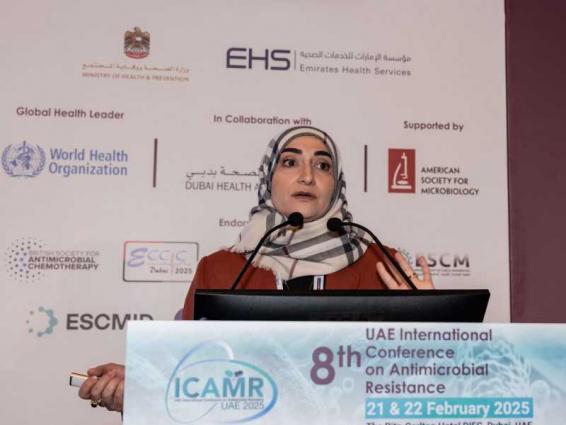
(UrduPoint / Pakistan Point News / WAM – 23rd Feb, 2025) DUBAI, 23rd February, 2025 (WAM) – The eighth UAE International conference on antimicrobial resistance concluded yesterday in Dubai after two days of intensive scientific discussions, which resulted in a number of important recommendations, most notably strengthening the “One Health” approach to confront antimicrobial resistance, through cooperation between the human, animal and environmental health sectors, and raising awareness of the risks of antimicrobial resistance among workers in related fields.
Dr.
Najiba Abdul Razzaq, consultant internal medicine and President of the conference, said that lecturers warned against taking antibiotics as soon as they feel respiratory symptoms, or colds, except by prescription of a doctor, because more than 90% of these cases are caused by viruses.
Antidotes will not eliminate them, on the contrary, they harm their user because they promote antibiotic resistance in the resigned and increase the risk of contracting resistant bacteria.
Participants in the conference stressed the importance of raising awareness of the correct use of antibiotics, which will pose a major challenge to health policymakers, as the lack of awareness increases the ability of pathogenic bacteria and infections to resist antibiotics, making them useless and threatening the medical development that the world is witnessing.
The two-day conference discussed early diagnosis by artificial intelligence, innovative treatments, effective strategies to control infection and reduce antibiotic resistance, how to prevent them and treat diseases due to antibiotic-resistant germs, the opportunities available and modern technologies to reduce the deaths associated with antimicrobial resistance, the challenges facing today’s doctor in this field, in addition to global trends and challenges related to antibiotic resistance, and highlighted the importance of collaborative efforts in addressing this issue.
Discussions also focused on advances in diagnostic techniques, innovative therapies and effective strategies for antimicrobial supervision, as well as exploring the role of behavioral science in shaping human behavior to promote better outcomes in the fight against antimicrobial resistance.
The conference aims to promote knowledge sharing, collaboration, innovation and action for a future in which antimicrobial resistance is effectively managed and to make infection control a global standard that protects global health.
Dr.
Najiba, president of the conference, described antimicrobial resistance as a “silent epidemic”, because usually, when antibiotics are prescribed, the patient is expected to improve when taking them, however, this smooth transition from disease to recovery has become difficult, due to antimicrobial resistance, which is becoming increasingly common.
Over the next 25 years, drug-resistant diseases are expected to cause about 39 million deaths.



